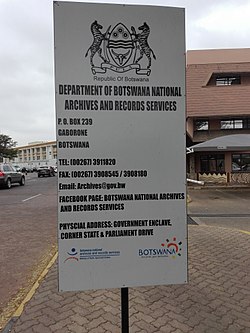| History of Botswana |
|---|
 |
| See also |
 Botswana Archives and records management centre | |
 | |
| Location | Gaborone, Botswana |
|---|---|
| Coordinates | 24°39′37″S25°54′36″E / 24.660346278227635°S 25.91010426128248°E |
| Type | Archives |
The National Archives of Botswana (Tswana : Ntlo ya peeletso ya lefatshe la Botswana) are the national archives of Botswana. They hold 20,000 items and are located in Gaborone. [1]


